开放英语 1 unit 10
- 格式:ppt
- 大小:356.50 KB
- 文档页数:27
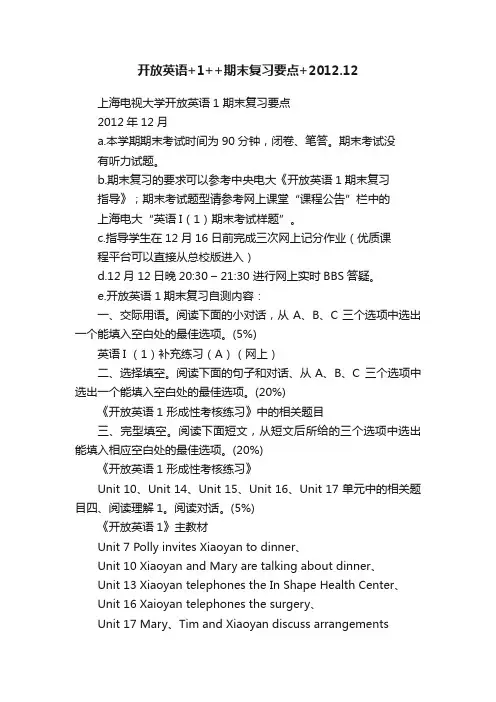
开放英语+1++期末复习要点+2012.12上海电视大学开放英语1 期末复习要点2012年12月a.本学期期末考试时间为90分钟,闭卷、笔答。
期末考试没有听力试题。
b.期末复习的要求可以参考中央电大《开放英语1期末复习指导》;期末考试题型请参考网上课堂“课程公告”栏中的上海电大“英语I(1)期末考试样题”。
c.指导学生在12月16日前完成三次网上记分作业(优质课程平台可以直接从总校版进入)d.12月12日晚20:30 – 21:30 进行网上实时BBS答疑。
e.开放英语1期末复习自测内容:一、交际用语。
阅读下面的小对话,从A、B、C三个选项中选出一个能填入空白处的最佳选项。
(5%)英语I (1)补充练习(A)(网上)二、选择填空。
阅读下面的句子和对话、从A、B、C 三个选项中选出一个能填入空白处的最佳选项。
(20%)《开放英语1 形成性考核练习》中的相关题目三、完型填空。
阅读下面短文,从短文后所给的三个选项中选出能填入相应空白处的最佳选项。
(20%)《开放英语1 形成性考核练习》Unit 10、Unit 14、Unit 15、Unit 16、Unit 17 单元中的相关题目四、阅读理解1。
阅读对话。
(5%)《开放英语1》主教材Unit 7 Polly invites Xiaoyan to dinner、Unit 10 Xiaoyan and Mary are talking about dinner、Unit 13 Xiaoyan telephones the In Shape Health Center、Unit 16 Xaioyan telephones the surgery、Unit 17 Mary、Tim and Xiaoyan discuss arrangements“阅读理解1”的例题:Unit 7(Extract 1)1. Polly is having a barbecue in the park. (F)2. Polly lives at 14 Perry Avenue. ( T )3. Polly invites Xiaoyan to stay the night. (T)4. The barbecue is at 6 o’clock. (F)5. Xiaoyan offers to bring some fruits. (F)Unit 10(Extract 1)1. Xiaoyan wants to invite her friends to breakfast. ( F)2. Tim is Mary’s boyfriend. (T)3. Franco is the landlord. (T)4. Mary is working today. (F)5. Mary loves Chinese food. (T)五、阅读理解2。
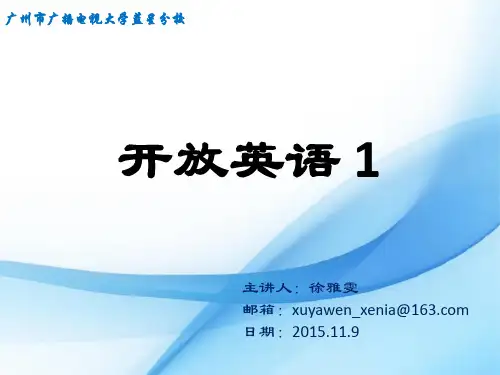
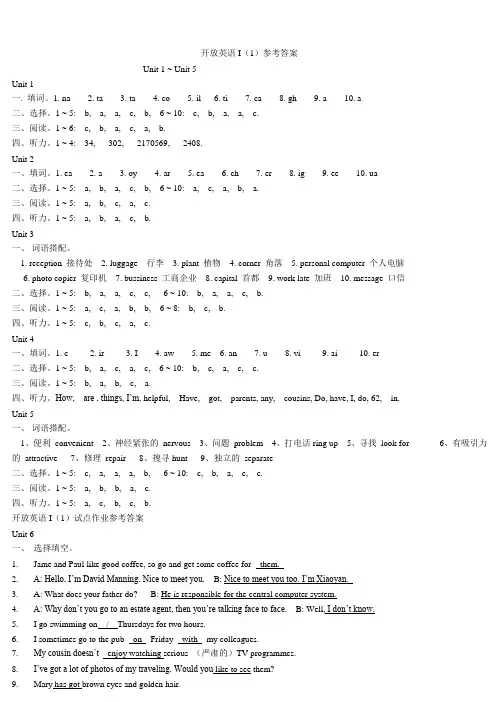
开放英语I(1)参考答案Unit 1 ~ Unit 5Unit 1一. 填词。
1. na 2. ta 3. ta 4. co 5. il 6. ti 7. ca 8. gh 9. a 10. a二、选择。
1 ~ 5: b, a, a, c, b, 6 ~ 10: c, b, a, a, c.三、阅读。
1 ~ 6: c, b, a, c, a, b.四、听力。
1 ~ 4: 34, 302, 2170569, 2408.Unit 2一、填词。
1. ea 2. a 3. oy 4. ar 5. ea 6. ch 7. er 8. ig 9. ee 10. ua二、选择。
1 ~ 5: a, b, a, c, b, 6 ~ 10: a, c, a, b, a.三、阅读。
1 ~ 5: a, b, c, a, c.四、听力。
1 ~ 5: a, b, a, c, b.Unit 3一、词语搭配。
1. reception 接待处2. luggage 行李3. plant 植物4. corner 角落5. personal computer 个人电脑6. photo copier 复印机7. bussiness 工商企业8. capital 首都9. work late 加班10. message 口信二、选择。
1 ~ 5: b, a, a, c, c, 6 ~ 10: b, a, a, c, b.三、阅读。
1 ~ 5: a, c, a, b, b, 6 ~ 8: b, c, b.四、听力。
1 ~ 5: c, b, c, a, c.Unit 4一、填词。
1. c 2. ir 3. I 4. aw 5. me 6. an 7. u 8. vi 9. ai 10. er二、选择。
1 ~ 5: b, a, c, a, c, 6 ~ 10: b, c, a, c, c.三、阅读。
1 ~ 5: b, a, b, c, a.四、听力。
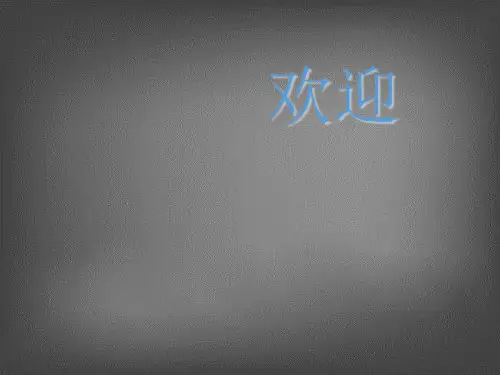
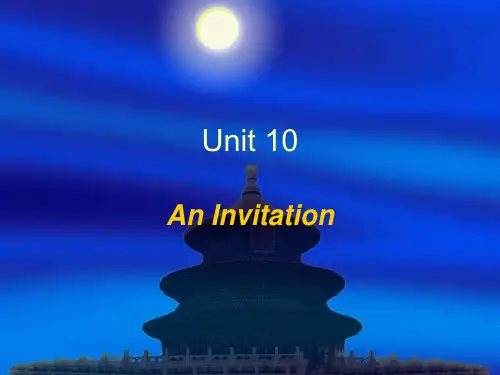

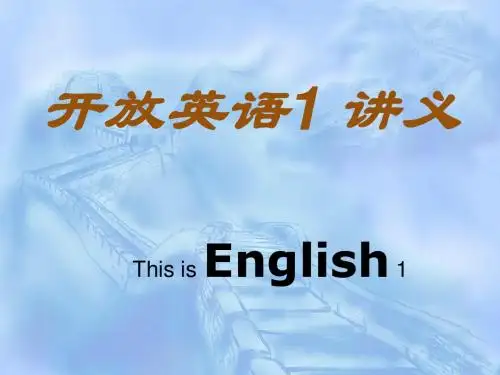
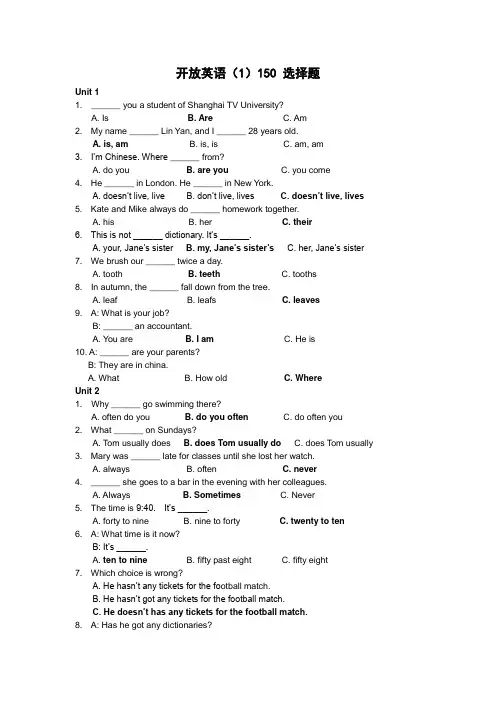
开放英语(1)150 选择题Unit 11. ______ you a student of Shanghai TV University?A. IsB. AreC. Am2. My name ______ Lin Yan, and I ______ 28 years old.A. is, amB. is, isC. am, am3. I’m Chinese. Where ______ from?A. do youB. are youC. you come4. He ______ in London. He ______ in New York.A. doesn’t live, liveB. don’t live, livesC. doesn’t live, lives5. Kate and Mike always do ______ homework together.A. hisB. herC. their6. This is not ______ dictionary. It’s ______.A. your, Jane’s sisterB. my, Jane’s sister’sC. her, Jane’s sister7. We brush our ______ twice a day.A. toothB. teethC. tooths8. In autumn, the ______ fall down from the tree.A. leafB. leafsC. leaves9. A: What is your job?B: ______ an accountant.A. You areB. I amC. He is10. A: ______ are your parents?B: They are in china.A. WhatB. How oldC. WhereUnit 21. Why ______ go swimming there?A. often do youB. do you oftenC. do often you2. What ______ on Sundays?A. Tom usually doesB. does Tom usually doC. does Tom usually3. Mary was ______ late for classes until she lost her watch.A. alwaysB. oftenC. never4. ______ she goes to a bar in the evening with her colleagues.A. AlwaysB. SometimesC. Never5. The time is 9:40. It’s ______.A. forty to nineB. nine to fortyC. twenty to ten6. A: What time is it now?B: It’s ______.A. ten to nineB. fifty past eightC. fifty eight7. Which choice is wrong?A. He hasn’t any tickets for the fo otball match.B. He hasn’t got any tickets for the football match.C. He doesn’t has any tickets for the football match.8. A: Has he got any dictionaries?B: Yes, he ______.A. doesB. doC. has9. A: Would you like to have a coffee?B: ______.A. yes, pleaseB. Yes, certainlyC. No, I’m sorry10. A: Could you sign the register, please?B: ______.A. Yes, pleaseB. Yes, of courseC. No, thank youUnit 31. This isn’t ______ easy job. I can’t finish it in ______ hour.A. a, aB. an, aC. an, an2. The IT Department is on ______ eighth floor of that building.A. /B. anC. the3. Beijing is ______ capital of China. It’s ______ very big city.A. a, theB. the, aC. a, a4. That is my CD, and ______ are yours.A. thisB. thatC. those5. There is ______ on the table.A. some breadB. some crispC. some peanut6. There aren’t ______ books in my bag.A. noB. someC. any7. Shall I ask him ______ time?A. twoB. secondC. a second8. There are ______ months in a year. ______ month is December.A. twelve, The twelfthB. twelfth, TwelveC. the twelve, Twelfth9. A: I’m going to clean the house.B: ______ do the shopping.A. I like toB. I wouldC. I’ll10. A: What would you like to drink?B: _______.A. Beer, pleaseB. Yes, pleaseC. No, thanksUnit 41. He ______ lunch with a customer now.A. hasB. haveC. is having2. Rose _______ two cousins in New York.A. has gotB. having gotC. is having3. Look at Tom! What ______?A. does he doB. is he doingC. he is doing4. It ______ hard, and I can’t go home without an umbrella.A. rainsB. rainingC. is raining5. I’m Japanese. Where ______ from?A. do you comeB. are you comingC. you are coming6. These ______ are very expensive.A. womens handbagsB. womens’ handbagsC. women’s handbags7. ______ football is under his bed.A. JonesB. Jones’C. Jones’s8. In front of the house are ______ cars.A. Tim and Jack’sB. Tim’s and JackC. Tim’s and Jack’s9. A: What do you do?B: ______.A. I’m an advertising managerB. I’m on holiday right nowC. I’m looking for my pen10. A: What is he doing?B: _______.A. He is an engineerB. He is talking to MaryC. He works in a construction companyUnit 51. The book cost ten ______ and fifty ______.A. dollar, centB. dollar, centsC. dollars, cents2. The rent is ______ each month.A. 2,000 yuansB. 2,0000 yuans’C. 2,000 yuan3. On the table there are ______.A. five ten-dollar billsB. five ten-dollars billC. five ten dollars bills4. The new house ______ £300 a month.A. spendsB. costsC. pays5. I ______ the flat in the centre of the town.A. am interested inB. am interesting inC. interest6. They are looking ______ a flat. They want one with a garden.A. onB. outC. for7. You can talk ______ with him.A. face to faceB. face on faceC. face with face8. I don’t like ______ things I don’t understand very well.A. talking aboutB. talking toC. talking with9. ______ call a taxi?A. What aboutB. How aboutC. Why don’t you10. How about ______?A. taking a holidayB. take a holidayC. to take a holidayUnit 71. They had a party ______ Christmas Eve.A. atB. inC. on2. It happened to be very cold ______ the morning of our sports meet.A. atB. ofC. on3. He decided to visit the family ______ Friday night.A. atB. inC. on4. My uncle lives ______ 105 Handan Road.a. on B. at C. of5. A: Are you free on Monday?B: No, I’m sorry, I’m busy. ______ Wednesday?A. Would you likeB. What aboutC. Why don’t you6. A: ______ to come to dinner tonight?B: Yes, I’d love to.A. Why don’t youB. What aboutC. Would you like7. The coat is ______ too large for me.A. veryB. quiteC. much8. The table is ______ for two people.A. not big enoughB. big not enoughC. big enough not9. How long ______?A. has the journeyB. is the journey likeC. does the journey take10. It takes ages ______.A. for doing the shoppingB. to do the shoppingC. does the shopping Unit 81. There is a beautiful clock ______ the wall of her bedroom.A. onB. overC. above2. A bridge was built ______ the river.A. onB. overC. above3. The cup is ______ the desk lamp.A. betweenB. amongC. next to4. Mary is sitting ______ Tom.A. in the front ofB. in front ofC. at the front of5. ______ Chinese in your English class.A. Not speakB. Don’t speakC. No speak6. Please ______ it on the small table.A. to putB. puttingC. put7. What’s the weather ______ this winter?A. likeB. inC. be8. It ______ in summer in England.A. will often rainB. is often rainingC. often rains9. You ______ in the office.A. can’t noisyB. can’t be noisyC. can’t make noisy10. A: Can I use the phone in the hall?B: ______.A. You can use themB. I’m afraidC. Of courseUnit 91. There is a chair ______ the corner of the room.A. inB. atC. under2. I’ll meet you ______ the corner of Smith Street.A. overB. inC. on3. Please wait for me ______ the corner ______ three o’clock.A. in, inB. on, onC. at, at4. ______! There’s a train coming.A. Look outB. Look aroundC. Look forward5. I cannot hear the radio. Would you please ______?A. turn it onB. turn it downC. turn it up6. The bus broke down and all the passengers had to ______.A. get inB. get onC. get off7. We should not be ______ towards our comrades.A. coldB. friendlyC. kind8. Mary doesn’t like going to parties and meeting new people. She is very ______.A. shyB. socialC. outgoing9. A: What does he ______?B: He is tall and good-looking.A. likeB. lookC. look like10. A: ______ is the nearest supermarket, please?B: It’s opposite the restaurant.A. WhatB. WhereC. HowUnit 101. A: I’d like ______ information about the school.B: You could have ______ word with the schoolmaster.A. some, aB. an, someC. some, some2. I need ______ cloth, for I am going to make ______ clothes.A. a lot of, manyB. much, muchC. many, many3. Tables are made of ______.A. woodB. woodsC. some woods4. I’ve been expecting ______ letters the whole day, but there aren’t ______ for me.A. some, anyB. many, a fewC. some, one5. Why don’t you have ______ bread?A. anyB. someC. little6. You can see ______ on the table.A. a packet of prawnB. two packets of prawnC. a packet of prawns7. A: How ______ bottles of wine will we need?B: We’ll need about 6 bottles, I think.A. manyB. muchC. more8. A: How ______ is the rent?B: It’s about 200 pounds a month.A: many B. much C. more9. Would you like ______ this afternoon?A. go shopping with meB. to go shopping with meC. to going shopping with me10. Shall I ______?A. phone him nowB. to phone him nowC. phoning him nowUnit 111. Mary ______ on shoes when she ______ them.A. tries, buysB. tries, buiesC. trys, buys2. The girl often ______ cold when she ______.A. catch, dancesB. catches, dancesC. catchs, dancees3. ______ your mother ______ some cleaning on Sundays?A. Does, doesB. Do, doesC. Does, do4. _______ Tom ______ to work hard to help his family? Yes, he ______.A. Does, have, doesB. Has, /, doesC. Does, has, has5. Which ______ teacher ______ lessons to you every day?A. /, givesB. does, giveC. do, give6. Many young people enjoy ______ sports games.A. watchB. watchingC. to watch7. I prefer watching TV ______.A. to read the paperB. reading the paperC. to reading the paper8. Can you show me how ______?A. use the washing machineB. to use the washing machineC. using the washing machine9. A: I sleep late on Sundays.B: So ____ I.A. haveB. doC. am10. A: Mary does a lot of housework before going to work.B: ______.A. So do I tooB. So I tooC. Me too。
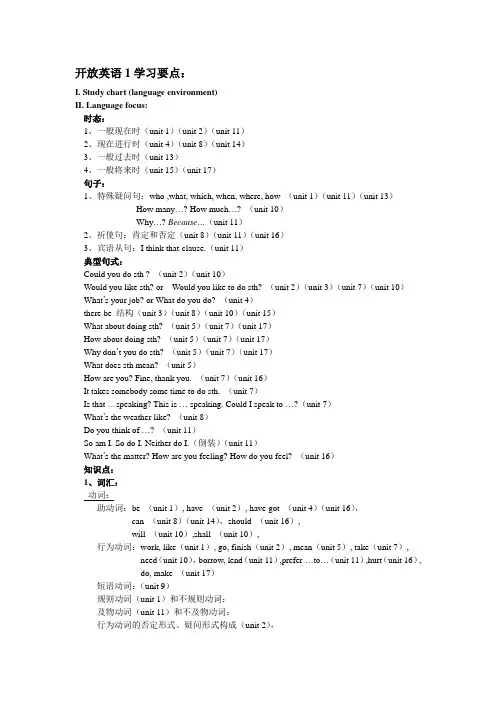
开放英语1学习要点:I. Study chart (language environment)II. Language focus:时态:1、一般现在时(unit 1)(unit 2)(unit 11)2、现在进行时(unit 4)(unit 8)(unit 14)3、一般过去时(unit 13)4、一般将来时(unit 15)(unit 17)句子:1、特殊疑问句:who ,what, which, when, where, how (unit 1)(unit 11)(unit 13)How many…? How much…? (unit 10)Why…? Because…(unit 11)2、祈使句:肯定和否定(unit 8)(unit 11)(unit 16)3、宾语从句:I think that-clause.(unit 11)典型句式:Could you do sth ? (unit 2)(unit 10)Would you like sth? or Would you like to do sth? (unit 2)(unit 3)(unit 7)(unit 10)What’s your job? or What do you do? (unit 4)there be 结构(unit 3)(unit 8)(unit 10)(unit 15)What about doing sth? (unit 5)(unit 7)(unit 17)How about doing sth? (unit 5)(unit 7)(unit 17)Why don’t you do sth? (unit 5)(unit 7)(unit 17)What does sth mean? (unit 5)How are you? Fine, thank you. (unit 7)(unit 16)It takes somebody some time to do sth. (unit 7)Is that …speaking? This is … speaking. Could I speak to …?(unit 7)What’s the weather like? (unit 8)Do you think of …? (unit 11)So am I. So do I. Neither do I.(倒装)(unit 11)What’s the matter? How are you feeling? How do you feel? (unit 16)知识点:1、词汇:动词:助动词:be (unit 1), have (unit 2), have got (unit 4)(unit 16),can (unit 8)(unit 14),should (unit 16),will (unit 10),shall (unit 10),行为动词:work, like(unit 1), go, finish(unit 2), mean(unit 5), take(unit 7), need(unit 10),borrow, lend(unit 11),prefer …to…(unit 11),hurt(unit 16),do, make (unit 17)短语动词:(unit 9)规则动词(unit 1)和不规则动词:及物动词(unit 11)和不及物动词:行为动词的否定形式、疑问形式构成(unit 2),带双宾语的行为动词(unit 15)(unit 16)名词:名词的所有格,名词的单数、复数(unit 1),可数名词和不可数名词(unit 10)(unit 15),代词:人称代词(主格和宾格),物主代词(名词性和形容词性)(unit 1)指示代词:this, that, these, those(unit 3)不定代词:some, any (unit 10), somebody(unit 17)反身代词:(unit 17)副词:频度副词:never, sometimes, often, usually, always(unit 2)顺序副词:first, next, after that, then, finally(unit 11)形容词:(unit7)(unit 8)(unit 9)(unit 13)形容词的比较级:规则变化和不规则变化more than 结构(unit 14)介词:at, for, from…to(unit 2)in(unit 4)方位介词on, in, under, above, next to, in front of, behind (unit 8)near, between, opposite, on the corner, outside (unit 9)表时间的介词:at, on, in, from …to, from…till, between…and(unit 13)不定冠词:a, an (unit 1)(unit 3)(unit 4)(unit 9)定冠词:the (unit 3)(unit 9)基数词和序数词:(unit 3)2、表达法:时刻的表达(unit 2)时间的表达(unit 13)介绍他人---This is …(unit 3)楼层的表达(unit 3)价格询问How much is sth? or How much does sth. cost?(unit 5)批评的表达too+adj. or not+adj.+enough (unit 7)打电话用语(unit 7)(unit 10)安排约会(unit 7)表达歉意I’m afraid…(unit 8)店铺名称的表达(unit 9)问路与指路(unit 9)谈论人的外貌和性格What does he like? What’s he like? (unit 9)兴趣爱好的表达(使用prefer, enjoy 等)(unit 11)数量“过多”和“足够”的表达too much, too many, enough(unit 15)动作、事件发生频率的表达once, twice, three times(unit 15)义务的表达have to (unit 15)表达指令及提出劝告need to, don’t need to , should, (unit 10)(unit 16)表示比较more than, as…as, the same as, be different from(unit 17)3、语言与文化问候与称呼(unit 2)(unit 7)礼貌用语(unit 9)4、语言应用:电子邮件的开头和结尾(unit 1)书信的基本格式(unit 13)个人简历(unit 14)。
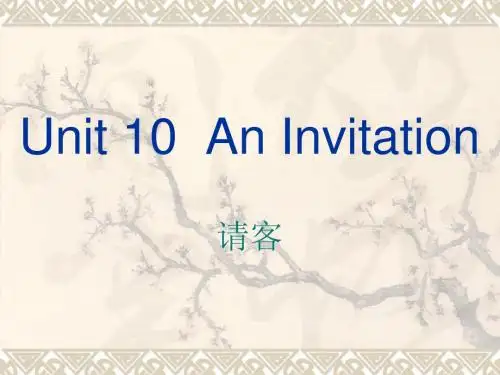
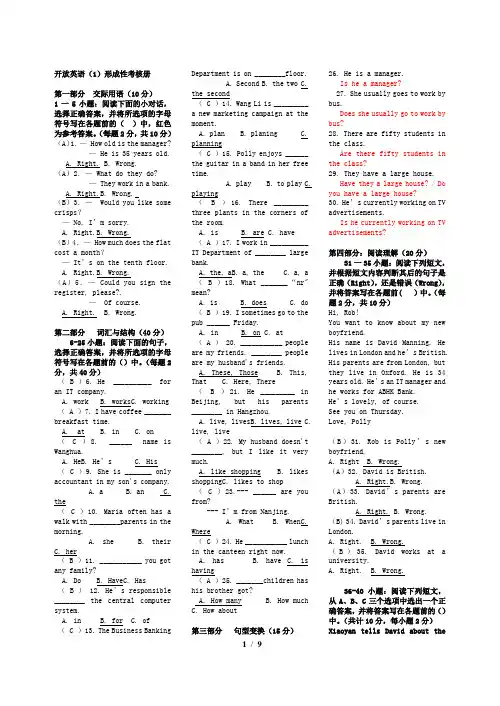
开放英语(1)形成性考核册第一部分交际用语(10分)1一5小题:阅读下面的小对话,选择正确答案,并将所选项的字母符号写在各题前的()中,红色为参考答案。
(每题2分,共10分)(A)1.— How old is the manager?— He is 35 years old.A. Right.B. Wrong.(A)2.— What do they do?— They work in a bank.A. Right.B. Wrong.(B)3.— Would you like some crisps?— No, I’m sorry.A. Right.B. Wrong.(B)4.— How much does the flat cost a month?— It’s on the tenth floor.A. Right.B. Wrong.(A)5.— Could you sign the register, please?.— Of course.A. Right.B. Wrong.第二部分词汇与结构(40分)6-25小题:阅读下面的句子,选择正确答案,并将所选项的字母符号写在各题前的()中。
(每题2分,共40分)( B )6. He __________ foran IT company.A. workB. worksC. working( A )7. I have coffee _______ breakfast time.A. atB. inC. on( C )8. ______ name is Wanghua.A. HeB. He’sC. His( C )9. She is _______ only accountant in my son's company.A. aB. anC.the( C )10. Maria often has a walk with ________parents in the morning.A. sheB. theirC. her( B )11. ___________ you gotany family?A. DoB. HaveC. Has( B ) 12. He’s responsible________ the central computer system.A. inB. forC. of( C )13. The Business Banking Department is on ________floor.A. SecondB. the twoC.the second( C )14. Wang Li is _________a new marketing campaign at themoment.A. planB. planingC.planning( C )15. Polly enjoys ______the guitar in a band in her freetime.A. playB. to playC.playing( B )16. There _________three plants in the corners ofthe room.A. isB. areC. have( A )17. I work in __________IT Department of ________ largebank.A. the, aB. a, theC. a, a( B )18. What _______“nr"mean?A. isB. doesC. do( B )19. I sometimes go to thepub ______ Friday.A. inB. onC. at( A ) 20. ___________ peopleare my friends. ________ peopleare my husband's friends.A. These, ThoseB. This,That C. Here, There( B )21. He _________ inBeijing, but his parents________ in Hangzhou.A. live, livesB. lives, liveC.live, live( A )22. My husband doesn't________, but I like it verymuch.A. like shoppingB. likesshoppingC. likes to shop( C )23.--- ______ are youfrom?--- I’m from Nanjing.A. WhatB. WhenC.Where( C )24. He ___________ lunchin the canteen right now.A. hasB. haveC. ishaving( A )25. _______children hashis brother got?A. How manyB. How muchC. How about第三部分句型变换(15分)26. He is a manager.Is he a manager?27. She usually goes to work bybus.Does she usually go to work bybus?28. There are fifty students inthe class.Are there fifty students inthe class?29. They have a large house.Have they a large house? / Doyou have a large house?30. He’s currently working on TVadvertisements.Is he currently working on TVadvertisements?第四部分:阅读理解(20分)31一35小题:阅读下列短文,并根据短文内容判断其后的句子是正确(Right),还是错误(Wrong),并将答案写在各题前( )中。
Unit 10 An Invitation学习重点:一、表达提议(P115)(P124)二、可数名词与不可数名词(P116)三、How much …和How many ...重点语法释析一、表达提议(P115)(P124)1. 提出请求Could you + do sth? 常用于表达请求。
Could you spell it, please? Yes, of course. / No, sorry I can’t.2. 表达提议Would you like…句型有三种结构Would you like + 名词?Would you like a newspaper?Yes, I would, thanks. / No, thank you. I have one at the office.Would you like + to + 动词?Would you like to have a coffee? Yes, please. / No, thanks.Would you like + 代词+ to +动词?Would you like me to phone Tim?3. 提议还可以用what以开头的疑问句表达。
What would you like to drink? I’d like a gin and tonic, please.What would you like, Polly? I’d like a glass of wine, thank you.4. 主动提出自己做某事,常用的句式为:I’ll(I will)+ 动词原形.I’ll buy the d rinks.5. 提出建议可以用下列几个句型。
What about + 动词-ing形式?What about seeing this flat? Well, I don’t knowHow about +动词-ing形式?How about going to an estate agent? Yes, that’s a good idea.Why don’t you +动词原形?Why don’t you go to an estate agent?6. Shall I + 动词原形?Shall I help you?7. 请求他人做某事的句型。
开放英语I(1)参考答案1、请写出下列名词的复数形式。
Parent photo bus life half child woman toothParents photos buses lives haves children women teeth2、频度副词often,always,sometimes等在句中的位置是有规律的,请写出这些规律,并各举一个例句。
(1)在动词 to be之后:Are you always at home on Sunday?(2)在实意动词之前:I sometimes go to London.(3)在含有助动词的句子中,置于助动词之后,实意动词之前。
I do not often go to work by bus.3、请写现在进行时的两种用法,并分别举一个例句。
(1)现在进行时表示此刻正在发生的事情或正在进行的动作。
He is talking to a customer.(2)现在进行时也可以表示这一段时期正在进行的活动,虽然在此时此刻江没有进行。
LiJun is working on a new database at the moment ,but right now she is sleeping.4、请用学过的功能句型介绍你自己的姓名、年龄、所在城市、工作。
请用英语写(略)开放英语(1)作业1第一部分交际用语1. A2. B3. B4. B5. A第二部分词汇与结构6. B7. A8. C 9 .C 10. C 11 .B 12 .B 13. C 14 .C 15. C16. B 17. A 18. B 19. B 20. A 21. B 22. A 23. C 24. C 25. A第三部分句型变换26. He is a manager.Is he a manager?27. She usually goes to work by bus.Does she usually go to work by bus?28. There are fifty students in the class.Are there fifty students in the class?29. They have a large house.Have they a large house? / Do you have a large house?30. He’s currently working on TV advertisements.Is he currently working on TV advertisements?第四部分阅读理解31.B 32.A 33.A 34.B 35.B 36.B 37.B 38.B 39.A 40.C第五部分翻译 41--45题:将下列英文句子翻译成中文。
开放英语1第一部分课程课程课程课程介绍一、课程性质及教学要求和学时安排1、本教材是中央电大为开放教育专科各专业学员公修课所编写的一套教材,主要供已具有初级英语水平的成人自学使用,起点为600词。
2、要求通过本教材的学习,使学习者通过大量的听、说、读、写的练习,能听懂发音清楚,语速较慢的教学用请和日常生活用语,能用英语进行简单的日常交谈等。
3、辅教学时 24学时二、教学媒体使用和教学过程1、文字教材《开放英语I》.刘黛琳.主编、中央广播电视大学出版社。
《开放英语I·综合练习》刘黛琳.主编、中央广播电视大学出版社。
《开放英语I·形成性考核手册》.中央广播电视大学出版社。
2、音像教材(或VCD) 录音带:2盘。
三、教学环节安排1、面授时间安排----由教务处通知。
2、自主化辅导:在面授辅导课前,自主学习相关模块的内容第一次面授课1-5单元第二次面授课6-10单元第三面授课11-15单元第四次面授课16-18 单元和模拟考试Unit1 Talking About People本单元将要学习Learn how to give information about yourself or another person (介绍自己或他人)Learn how to ask someone about themselves (询问他人情况)Learn how to talk about leisure activities 讨论休闲活动Learn how to give information about travel arrangements 讨论旅游安排Study numbers 数字Study vocabulary for countries and nationalities 国家与国籍New words and Expressionsage n. 年龄at the age of sb 在某人几岁的时候nationality n. 国籍national adj.民族的,国家的nation n. 国家company n. 公司复数companiestown n. 城镇landlord n. 房东parent n. 父亲 母亲复数parentsjob n. 工作,职业work/professioninformation n. 信息 消息inform v. 通知informer n. 告密者a piece of technology n. 技术IT信息技术manager n. 经理manage v. 管理,经营owner n. 拥有者own v. 拥有restaurant n. 餐馆bank n. 银行university n. 大学复数universitiesdeputy adj. 副的副经理deputy manageraccountant n. 会计师engineer n. 工程师wife n. 妻子复数wives 丈夫husbandsecretary n. 秘书detail adj. 细节 详细detailed adj. 详细的local adj. 当地的 地方的flight n. 航班 空中旅行 飞行fly v.mobile adj. 可移动的mobile phone手机oxford 牛津London伦敦Britain英国British英国人 英国的China中国Chinese中国人 中国的 中文America美国American美国人 美国的Germany德国German德国人 德国的 德语Greece希腊Greek希腊人 希腊的Italy意大利Italian意大利人 意大利的Russia俄罗斯Russian俄国人 俄国的 俄语Japan—JapaneseKorea—KoreanItaly—ItalianCanada—CanadianSpain—SpanishAustralia—AstralianEgypt—EgyptianSituation Lin Xiaoyan arrives in LondonSession 1Learn to give basic information about a person and their job Study the use of a and an 学习a/an的用法Study the verb to be 学习动词to be1 Learn to give basic information about a person and their job Here is a list of jobs for your reference.worker 工人salesman 推销员doctor 医生clerk 职员shop assistant 售货员soldier 士兵nurse 护士receptionist 接待员officer官员editor 编辑postman 邮递员director 主管chef 主厨civil servant 公务员baker 面包师Chief Executive [igˈzekjutiv] Officer (CEO)首席执行官How to introduce yourselfI am/My name is David Manning.I am 34 years old.I am British.I live in London.I am an Information Technology Manager.I work at the ABHK Bank in London.2 不定冠词a/an 表示职业的名词前一般用冠词a\an, 表示“一个”或者“一”。
开放英语(1)选择题(Units1-11)开放英语(1)150 选择题Unit 11. ______ you a student of Shanghai TV University?A. IsB. AreC. Am2. My name ______ Lin Yan, and I ______28 years old.A. is, amB. is, isC. am, am3. I’m Chinese. Where ______ from?A. do youB. are youC. you come4. He ______ in London. He ______ in New York.A. doesn’t live, liveB. don’t live, livesC. doesn’t live, lives5. Kate and Mike always do ______ homework together.A. hisB. herC. their6. This is not ______ dictionary. It’s______.A. your, Jane’s sisterB. my, Jane’s sister’sC. her, Jane’s sister7. We brush our ______ twice a day.A. toothB. teethC. tooths8. In autumn, the ______ fall down from the tree.A. leafB. leafsC. leaves9. A: What is your job?B: ______ an accountant.A. You areB. I amC. He is10. A: ______ are your parents?B: They are in china.A. WhatB. How oldC. WhereUnit 21. Why ______ go swimming there?A. often do youB. do you oftenC. do often you2. What ______ on Sundays?A. Tom usually doesB. does Tom usually doC. does Tom usually3. Mary was ______ late for classes until she lost her watch.A. alwaysB. oftenC. never4. ______ she goes to a bar in the evening with her colleagues.A. AlwaysB. SometimesC. Never5. The time is 9:40. It’s ______.A. forty to nineB. nine to fortyC. twenty to ten6. A: What time is it now?B: It’s ______.A. ten to nineB. fifty past eightC. fifty eight7. Which choice is wrong?A. He hasn’t any tickets for the football match.B. He hasn’t got any tickets for thefootball match.C. He doesn’t has any tickets for the football match.8. A: Has he got any dictionaries?B: Yes, he ______.A. doesB. doC. has9. A: Would you like to have a coffee?B: ______.A. yes, pleaseB. Yes, certainlyC. No, I’m sorry10. A: Could you sign the register, please?B: ______.A. Yes, pleaseB. Yes, of courseC. No, thank youUnit 31. T his isn’t ______ easy job. I can’t finish it in ______ hour.A. a, aB. an, aC. an, an2. The IT Department is on ______ eighth floor of that building.A. /B. anC. the3. Beijing is ______ capital of China. It’s ______ very big city.A. a, theB. the, aC. a, a4. That is my CD, and ______ are yours.A. thisB. thatC. those5. There is ______ on the table.A. some breadB. some crispC. some peanut6. There aren’t ______ books in my bag.A. noB. someC. any7. Shall I ask him ______ time?A. twoB. secondC. a second8. There are ______ months in a year. ______ month is December.A. twelve, The twelfthB. twelfth, TwelveC. the twelve, Twelfth9. A: I’m going to clean the house.B: ______ do the shopping.A. I like toB. I wouldC. I’ll10. A: What would you like to drink?B: _______.A. Beer, pleaseB. Yes, pleaseC. No, thanksUnit 41. He ______ lunch with a customer now.A. hasB. haveC. is having2. Rose _______ two cousins in New York.A. has gotB. having gotC. is having3. Look at Tom! What ______?A. does he doB. is he doingC. he is doing4. It ______ hard, and I can’t go home without an umbrella.A. rainsB. rainingC. is raining5. I’m Japanese. Where ______ from?A. do you comeB. are you comingC. you are coming6. These ______ are very expensive.A. womens handbagsB. womens’ handbagsC. women’s handbags7. ______ football is under his bed.A. JonesB. Jones’C. Jones’s8. In front of the house are ______ cars.A. Tim and Jack’sB. Tim’s and JackC. Tim’s and Jack’s9. A: What do you do?B: ______.A. I’m an advertising managerB. I’m on holiday right nowC. I’m looking for my pen10. A: What is he doing?B: _______.A. He is an engineerB. He is talking to MaryC. He works in a construction company Unit 51. The book cost ten ______ and fifty ______.A. dollar, centB. dollar, centsC. dollars, cents2. The rent is ______ each month.A. 2,000 yuansB. 2,0000 yuans’C. 2,000 yuan3. On the table there are ______.A. five ten-dollar billsB. five ten-dollars billC. five ten dollars bills4. The new house ______ £300 a month.A. spendsB. costsC. pays5. I ______ the flat in the centre of the town.A. am interested inB. am interesting inC. interest6. They are looking ______ a flat. They want one with a garden.A. onB. outC. for7. You can talk ______ with him.A. face to faceB. face on faceC. face with face8. I don’t like ______ things I don’t understand very well.A. talking aboutB. talking toC. talking with9. ______ call a taxi?A. What aboutB. How aboutC. Why don’t you10. How about ______?A. taking a holidayB. take a holidayC. to take a holidayUnit 71. They had a party ______ Christmas Eve.A. atB. inC. on2. It happened to be very cold ______ the morning of our sports meet.A. atB. ofC. on3. He decided to visit the family ______ Friday night.A. atB. inC. on4. My uncle lives ______ 105 Handan Road.a. on B. atC. of5. A: Are you free on Monday?B: No, I’m sorry, I’m busy. ______ Wednesday?A. Would you likeB. What aboutC. Why don’t you6. A: ______ to come to dinner tonight? B: Yes, I’d love to.A. Why don’t youB. What aboutC. Would you like7. The coat is ______ too large for me.A. veryB. quiteC. much8. The table is ______ for two people.A. not big enoughB. big not enoughC. big enough not9. How long ______?A. has the journeyB. is the journey likeC. does the journey take10. It takes ages ______.A. for doing the shoppingB. to do the shoppingC. does the shoppingUnit 81. There is a beautiful clock ______ the wall of her bedroom.A. onB. overC. above2. A bridge was built ______ the river.A. onB. overC. above3. The cup is ______ the desk lamp.A. betweenB. amongC. next to4. Mary is sitting ______ Tom.A. in the front ofB. in front ofC. at the front of5. ______ Chinese in your English class.A. Not speakB. Don’t speakC. No speak6. Please ______ it on the small table.A. to putB. puttingC. put7. What’s the weather ______ this winter?A. likeB. inC. be8. It ______ in summer in England.A. will often rainB. is often rainingC. often rains9. You ______ in the office.A. can’t noisyB. can’t be noisyC. can’t make noisy10. A: Can I use the phone in the hall?B: ______.A. You can use themB. I’m afraidC. Of courseUnit 91. There is a chair ______ the corner of the room.A. inB. atC. under2. I’ll meet you ______ the corner of Smith Street.A. overB. inC. on3. Please wait for me ______ the corner ______ three o’clock.A. in, inB. on, onC. at, at4. ______! There’s a train coming.A. Look outB. Look aroundC. Look forward5. I cannot hear the radio. Would you please ______?A. turn it onB. turn it downC. turn it up6. The bus broke down and all the passengers had to ______.A. get inB. get onC. get off7. We should not be ______ towards ourcomrades.A. coldB. friendlyC. kind8. Mary doesn’t like going to parties andmeeting new people. She is very ______.A. shyB. socialC. outgoing9. A: What does he ______?B: He is tall and good-looking.A. likeB. lookC. look like10. A: ______ is the nearest supermarket,please?B: It’s opposite the restaurant.A. WhatB. WhereC. HowUnit 101. A: I’d like ______ information about the school.B: You could have ______ word with theschoolmaster.A. some, aB. an, someC. some, some2. I need ______ cloth, for I am going to make ______ clothes.A. a lot of, manyB. much, muchC. many, many3. Tables are made of ______.A. woodB. woodsC. some woods4. I’ve been expecting ______ letters thewhole day, but there aren’t ______ for me.A. some, anyB. many, a fewC. some, one5. Why don’t you have ______ bread?A. anyB. someC. little6. You can see ______ on the table.A. a packet of prawnB. two packetsof prawn C. a packet of prawns 7. A: How ______ bottles of wine will weneed?B: We’ll need about 6 bottles, I think.A. manyB. muchC. more8. A: How ______ is the rent?B: It’s about 200 pounds a month.A: many B. muchC. more9. Would you like ______ this afternoon?A. go shopping with meB. to go shopping with meC. to going shopping with me10. Shall I ______?A. phone him nowB. to phone him nowC. phoning him nowUnit 111. Mary ______ on shoes when she ______ them.A. tries, buysB. tries, buiesC. trys, buys2. The girl often ______ cold when she ______.A. catch, dancesB. catches, dancesC. catchs, dancees3. ______ your mother ______ some cleaning on Sundays?A. Does, doesB. Do, doesC. Does, do4. _______ Tom ______ to work hard to help his family? Yes, he ______.A. Does, have, doesB. Has, /, doesC. Does, has, has5. Which ______ teacher ______ lessons to you every day?A. /, givesB. does, giveC. do, give6. Many young people enjoy ______ sports games.A. watchB. watchingC. to watch7. I prefer watching TV ______.A. to read the paperB. reading the paperC. to reading the paper8. Can you show me how ______?A. use the washing machineB. to use the washing machineC. using the washing machine9. A: I sleep late on Sundays.B: So ____ I.A. haveB. doC. am10. A: Mary does a lot of housework before going to work.B: ______.A. So do I tooB. So I tooC. Me too。